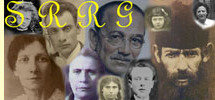



Emanuel Ringelblum
(November 21, 1900 – March 7, 1944) was a Polish-Jewish historian, politician
and social worker, known for his Notes from the Warsaw Ghetto, Notes
on the Refugees in Zbąszyn chronicling the deportation of Jews from
the town of Zbąszyń, and the so-called Ringelblum's Archives of the
Warsaw Ghetto. Before the war He was born in Buchach, then in the
Austro-Hungarian Empire, now in Ukraine. Ringelblum graduated from Warsaw
University, where he completed his doctoral thesis in 1927 on the history of
the Jews of Warsaw during the Middle Ages. Thereafter he taught history in
Jewish schools and became a member of a political movement the “Left Po’alei
Zion”. He was known as a historian and a specialist in the field of the history
of Polish Jews from the late Middle Ages to the 18th century. Before the Second
World War Ringelblum worked for social organizations. Most notably, he helped
Polish Jews expelled from Germany in 1938 and 1939. World War II During the war Ringelblum and his family
were resettled to the Warsaw Ghetto. There he led a secret operation code-named
Oyneg Shabbos (Yiddish for "Sabbath delight"). Together with numerous
other Jewish writers, scientists and ordinary people, Ringelblum collected
diaries, documents, commissioned papers, and preserved the posters and decrees
that comprised the memory of the doomed community. Among approximately 25,000
sheets preserved there are also detailed descriptions of destruction of ghettos
in other parts of occupied Poland, the Treblinka extermination camp,
Chełmno extermination camp and a number of reports made by scientists
conducting research on the effects of famine in the ghettos. He was also one of the most active members
of Żydowska Samopomoc Społeczna (Polish for Jewish Social Aid), an
organisation established to help the starving people of the Warsaw Ghetto. On
the eve of the ghetto's destruction in the spring of 1943, when all seemed
lost, the archive was placed in three milk cans and metal boxes. Parts were
buried in the cellars of Warsaw buildings. Shortly before the Warsaw Ghetto Uprising,
Ringelblum and his family escaped from the Ghetto and found refuge outside of
it. However, on 7 March 1944 their hiding place (prewar address 81 Grójecka
Street) was discovered by the Gestapo; Ringelblum and his family were executed
along with those who hid them.
Plaque in memory of around 40 Jews – among them
Emanuel Ringelblum – and the Wolski family,
at 77 Grójecka Street in Warsaw Ringelblum
archives The fate of Ringelblum's archives is only
partially known. In September 1946 ten metal boxes were found in the ruins of
Warsaw. In December 1950 in a cellar of another ruined house at 68 Nowolipki
Street two additional milk cans were found containing more documents. Among
them were copies of several underground newspapers, a narrative of deportations
from the Warsaw Ghetto, and public notices by the Judenrat (the council of
Jewish leaders), but also documents of ordinary life, concert invitations, milk
coupons, and chocolate wrappers. Despite repeated searches, the rest of the
archive, including the third milk can, was never found. It is rumoured to be
located beneath what is now the Chinese Embassy in Warsaw. The Jewish Historical Institute in Warsaw
is named for him.
One of the milk cans used to hide documents.
From the Ringelblum "Oyneg Shabbos" Archive Emanuel
Ringelblum: The Creator of “Oneg Shabbat” Holocaust Research Project. Gilbert,
Martin (2002). The
Routledge Atlas of the Holocaust. Psychology
Press. p. 10. ISBN 978-0-415-28145-4. Emanuel Ringelblum
From Wikipedia, the free encyclopedia



Published works
Polish-Jewish Relations during the Second World
War
(1974)
References
Bibliography
External links
This page is hosted at no cost to the public by JewishGen, Inc., a non-profit corporation. If you feel there is a benefit to you in accessing this site, your JewishGen-erosity is appreciated.
Last updated
05/25/2014 by ELR
Copyright © 2014 SRRG